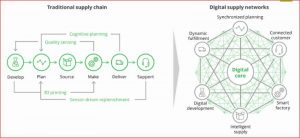
While companies are increasingly aware of the benefits of digital supply networks (DSNs), many remain in the early phases of adoption.
According to a new study (“Embracing a digital future: How manufacturers can unlock the transformative benefits of digital supply networks,”) conducted by Deloitte and the Manufacturers Alliance for Productivity and Innovation (MAPI), there is a disconnect between executives’ opinions of their DSN efforts and actual implementation. The survey, of more than 200 manufacturing organizations, found that 51% of respondents believe their DSN maturity is at least “above average” compared to competitors. Yet only 28% have started implementing DSN solutions.

Stephen Laaper, principal, Deloitte Consulting LLP and co-author of the study said: “While enthusiasm is high and manufacturers realize the benefits of Digital Supply Networks, many companies struggle to identify the right technology landscape which will provide the most value when they are approaching a digital shift. As a result, many hold off with key aspects of their transformation, which in turn puts their transformation at too slow a place to avoid disruption.”
More from the survey
Further survey results suggest that end-to-end supply chain transparency is the No. 1 operational goal for many manufacturers. This represents the key to significant efficiency gains. But only 6% of respondents belong to a ‘manufacturing ecosystem’ in which every member of the ecosystem can see each other’s data.
Most executives surveyed believe DSNs can provide significant advantages in comparison to traditional linear supply chains. Few expect implementation will lead to game-changing positive impacts. Over half of the respondents surveyed (56%) stated they believe a DSN will provide a significant benefit to their company.
Speed is a primary consideration among manufacturing organizations surveyed. Most respondents (52%) cited the ability to reduce the time to make strategic decisions as a top reason. The ability to operate more efficiently and effectively arose with 43%.
Many manufacturing companies recognize the potential financial benefits of DSNs. When asked about the most important financial goals of a DSN, justifications cited included:
- increasing sales efficiency/effectiveness (22%)
- reducing operating costs (17%)
- improving pricing and margins (17%).
Key challenges facing manufacturers
The changing nature of work in advanced manufacturing technology may also impact DSN rollouts. Two of the biggest barriers associated with implementing DSNs were finding, then training employees. 30% cited these as a challenge.
Additionally, organizations are hesitant to change. Almost 40% said overcoming resistance to change is the greatest risk to the success of their DSN initiatives. 33% offered challenges due to silos/lack of integration as being a major inhibitor.
“There is no one way to deploy a DSN,” said John Miller, council director, MAPI. “All companies operate differently, thus their DSN implementations carry unique challenges based on the existing infrastructure, talent base, culture and technological requirements.”
Supply chain and cybersecurity worries
17% of respondents said cyber risk is the main reason they are reluctant to provide production data to outside suppliers, a key component of many DSNs. Few have, however, taken action to protect themselves. Just 38% had conducted an internal cyber risk assessment in the past year.
In theory blockchain technology should alleviate cyber risk concerns, by enabling authenticated data communication across a trusted network. The study showed that blockchain was among the technologies drawing the least investment attention (at 17% of respondents).
“Blockchain can increase trust and transparency among ecosystem partners while helping reduce both the cost and risk of moving information across a supply network,” added Laaper. “As organizations develop a greater understanding of this relatively nascent technology and the value it represents, adoption rates should increase.”
The path forward to DSNs
While there are hurdles, Deloitte and MAPI found respondents optimistic about the future overall. The survey suggests that executives recognize the benefits of implementing digital supply networks, particularly by way of increased efficiency, speed-to-market and improving top and bottom line numbers.
To help determine the ‘best route’ to digital transformation, Deloitte and MAPI inist enterprises consider the following questions:
- what is the strategic vision they are working toward?
- how are they going to win?
- how do they execute in sprints to start down the path without having all the details worked out?
“Companies that are too conservative in their approach may wait too long before finally implementing initiatives that are too large and complex,” said Miller. “In the end, these companies risk being late to the game and implementing solutions whose value is hard to measure because of either the time it takes to show an improvement or the overall scale of the implementation.”
As an alternative, Deloitte and MAPI recommend enterprises adopt a “digital foundry” approach. This is where ideas which might offer ‘breakthrough potential’ (in terms of business impact) are generated and screened before prototyping and piloting. This can:
- reduce the barriers to DSN implementation
- manage risk exposure by validating ideas using defined steps in a controlled environment.
What does this mean
This survey’s focus aimed to engage manufacturing executives in a conversation to understand “the journey that companies have embarked on to design and implement systems that integrate data and information from disparate sources and locations to drive the physical act of production and distribution of manufactured goods”. Some 200 companies participated, operating in the manufacturing sector.
As the quotation in the paragraph above intimates, this is a survey/study riddled with management-speak. If one can bypass this, and the relatively small sample size, the results disappoint, especially about DSNs and blockchain. What is not clear is how the enterprises which responded were included. There is plenty else going on in the blockchain area (see EximChain, and upending supply chains – to mention just two).
That said, the excess of optimism over actual action depresses. More should be happening. To believe Deloitte and MAPI’s results, it is not.
























